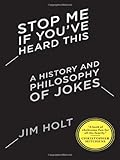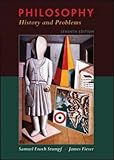|
|
Help |
| Home - Basic P - Philosophy History General (Books) | |
e99 Online Shopping Mall
|
|
Help |
| Home - Basic P - Philosophy History General (Books) | |
| Back | 81-100 of 100 |
click price to see details click image to enlarge click link to go to the store
| 81. Heine: On the History of Religion and Philosophy in Germany (Cambridge Texts in the History of Philosophy) | |
 | Hardcover: 264
Pages
(2007-09-24)
list price: US$90.00 -- used & new: US$20.36 (price subject to change: see help) Asin: 0521861292 Canada | United Kingdom | Germany | France | Japan |
|
Editorial Review Product Description | |
| 82. Theories Of Macrocosms And Microcosms: In The History Of Philosophy (1922) by George Perrigo Conger | |
| Hardcover: 168
Pages
(2010-09-10)
list price: US$29.56 -- used & new: US$27.77 (price subject to change: see help) Asin: 1167266277 Canada | United Kingdom | Germany | France | Japan | |
|
Editorial Review Product Description | |
| 83. Stop Me If You've Heard This: A History and Philosophy of Jokes by Jim Holt | |
 | Hardcover: 160
Pages
(2008-07-17)
list price: US$15.95 -- used & new: US$3.45 (price subject to change: see help) Asin: 0393066738 Average Customer Review: Canada | United Kingdom | Germany | France | Japan |
|
Editorial Review Product Description Customer Reviews (11)
| |
| 84. Greek Philosophy: Thales to Aristotle (Readings in the History of Philosophy) | |
 | Paperback: 446
Pages
(1991-10-14)
list price: US$18.95 -- used & new: US$6.80 (price subject to change: see help) Asin: 0029004950 Average Customer Review: Canada | United Kingdom | Germany | France | Japan |
|
Editorial Review Product Description Widely praised for its accessibility and its concentration on the metaphysical issues that are most central to the history of Greek philosophy, Greek Philosophy: Thales to Aristotle offers a valuable introduction to the works of the Presocratics, Plato, and Aristotle. For the Third Edition, Professor Allen has provided new translations of Socrates' speech in the Symposium and of the first five chapters of Aristotle's Categories, as well as new selections bearing on Aristotle's Theory of Infinity, Continuity, and Discreteness. The book also contains a general introduction which sets forth Professor Allen's distinctive and now widely accepted interpretation of the development of Greek philosophy and science, along with selective bibliography, and lists of suggested readings. Customer Reviews (3)
| |
| 85. The Dream of Reason: A History of Philosophy from the Greeks to the Renaissance by Anthony Gottlieb | |
 | Hardcover: 352
Pages
(2001-01)
list price: US$27.95 -- used & new: US$8.02 (price subject to change: see help) Asin: 0393049515 Average Customer Review: Canada | United Kingdom | Germany | France | Japan |
|
Editorial Review Product Description Gottlieb is an admirable guide through the little-understood pre-Socratic philosophers of ancient Greece, giving fair measure to philosophers who are too often simplified or lampooned. His account of Plato and Aristotle is good too, as is his treatment of the later Hellenistic schools, Epicureanism, Stoicism, and Skepticism. Gottlieb's treatment of medieval philosophy, particularly Thomist and Arabic philosophy, is lean, as the author chooses to focus more heavily on antiquity and the modern era (to be continued in a second volume), and the narrative history that bridges the two. Ever enthusiastic, Gottlieb's storytelling voice and character-driven approach make The Dream of Reason compelling reading. It is an ideal book for nonexperts interested in an appealing and informative history of philosophy as well as for students looking for a lucid and comprehensive account of premodern thinkers. --Eric de Place Customer Reviews (15)
| |
| 86. Another Philosophy of History and Selected Political Writings by Johann Gottfried Herder | |
 | Paperback: 224
Pages
(2004-03-15)
list price: US$16.95 -- used & new: US$13.00 (price subject to change: see help) Asin: 0872207153 Canada | United Kingdom | Germany | France | Japan |
|
Editorial Review Product Description | |
| 87. From Aristotle to Augustine: Routledge History of Philosophy Volume 2 | |
 | Paperback: 480
Pages
(2003-05-01)
list price: US$41.95 -- used & new: US$32.59 (price subject to change: see help) Asin: 0415308747 Canada | United Kingdom | Germany | France | Japan |
|
Editorial Review Product Description | |
| 88. An Introduction to Political Philosophy (Cambridge Introductions to Philosophy) by Colin Bird | |
 | Hardcover: 322
Pages
(2007-01-15)
list price: US$96.00 -- used & new: US$72.76 (price subject to change: see help) Asin: 0521836255 Canada | United Kingdom | Germany | France | Japan |
|
Editorial Review Product Description | |
| 89. A New Philosophy of History | |
 | Paperback: 300
Pages
(1995-10-15)
list price: US$30.00 -- used & new: US$20.00 (price subject to change: see help) Asin: 0226021009 Canada | United Kingdom | Germany | France | Japan |
|
Editorial Review Product Description | |
| 90. The Cambridge History of Later Medieval Philosophy: From the Rediscovery of Aristotle to the Disintegration of Scholasticism, 1100-1600 | |
 | Paperback: 1056
Pages
(1988-07-29)
list price: US$103.00 -- used & new: US$84.00 (price subject to change: see help) Asin: 0521369339 Average Customer Review: Canada | United Kingdom | Germany | France | Japan |
|
Editorial Review Product Description Customer Reviews (3)
| |
| 91. Worldviews: An Introduction to the History and Philosophy of Science by Richard DeWitt | |
 | Paperback: 392
Pages
(2010-10-12)
list price: US$34.95 -- used & new: US$27.39 (price subject to change: see help) Asin: 1405195630 Average Customer Review: Canada | United Kingdom | Germany | France | Japan |
|
Editorial Review Product Description Customer Reviews (1)
| |
| 92. The Biographical History of Philosophy: From Its Origin in Greece Down to the Present Day, Volume 1 by George Henry Lewes | |
 | Paperback: 380
Pages
(2010-02-24)
list price: US$33.75 -- used & new: US$19.48 (price subject to change: see help) Asin: 1145665772 Canada | United Kingdom | Germany | France | Japan |
|
Editorial Review Product Description | |
| 93. A New History of Philosophy: Ancient and Medieval by Wallace I. Matson | |
 | Paperback: 249
Pages
(1988-08)
list price: US$22.00 -- used & new: US$19.92 (price subject to change: see help) Asin: 0155657283 Canada | United Kingdom | Germany | France | Japan |
|
Editorial Review Product Description | |
| 94. A Brief History of Liberty (Brief Histories of Philosophy) by David Schmidtz, Jason Brennan | |
 | Paperback: 280
Pages
(2010-02-15)
list price: US$29.95 -- used & new: US$17.85 (price subject to change: see help) Asin: 1405170794 Average Customer Review: Canada | United Kingdom | Germany | France | Japan |
|
Editorial Review Product Description Customer Reviews (3)
| |
| 95. A Critical History of Western Philosophy | |
 | Paperback: 612
Pages
(1985-08-01)
list price: US$36.95 -- used & new: US$22.92 (price subject to change: see help) Asin: 0029238404 Average Customer Review: Canada | United Kingdom | Germany | France | Japan |
Customer Reviews (1)
| |
| 96. A History of Scottish Philosophy by Alexander Broadie | |
 | Paperback: 304
Pages
(2010-02-15)
list price: US$40.00 -- used & new: US$34.32 (price subject to change: see help) Asin: 0748616284 Canada | United Kingdom | Germany | France | Japan |
|
Editorial Review Product Description "An important and impressive book."& mdash; The Herald "A profound history by the recognized master in the field."& mdash; The Scotsman This volume highlights a number of philosophers from the late-thirteenth to mid- twentieth centuries and explicates philosophy's intimate relatationship with Scottish culture. It showcases the work of major figures& mdash;John Duns Scotus, Francis Hutcheson, David Hume, Adam Smith, and Thomas Reid& mdash; along with lesser-known ye still brilliant talents: John Mair, George Lokert, Frederick Ferrier, Andrew Seth, Norman Kemp Smith, and John Macmurray. | |
| 97. A New History of Western Philosophy by Anthony Kenny | |
 | Hardcover: 1000
Pages
(2010-10-24)
list price: US$39.95 -- used & new: US$28.76 (price subject to change: see help) Asin: 0199589887 Canada | United Kingdom | Germany | France | Japan |
|
Editorial Review Product Description | |
| 98. The Renaissance and 17th Century Rationalism: Routledge History of Philosophy Volume 4 | |
 | Paperback: 480
Pages
(2003-05-01)
list price: US$41.95 -- used & new: US$33.75 (price subject to change: see help) Asin: 0415308763 Canada | United Kingdom | Germany | France | Japan |
|
Editorial Review Product Description | |
| 99. Philosophy: History and Problems by Samuel Enoch Stumpf, James Fieser | |
 | Paperback: 960
Pages
(2007-08-03)
-- used & new: US$95.00 (price subject to change: see help) Asin: 0072987820 Average Customer Review: Canada | United Kingdom | Germany | France | Japan |
|
Editorial Review Product Description Customer Reviews (5)
| |
| 100. Critical Traditions in Contemporary Archaeology: Essays in the Philosophy, History and Socio-Politics of Archaeology by Valerie Pinsky | |
| Paperback: 160
Pages
(1995-04)
list price: US$19.95 -- used & new: US$67.70 (price subject to change: see help) Asin: 0826315992 Canada | United Kingdom | Germany | France | Japan | |
|
Editorial Review Product Description | |
| Back | 81-100 of 100 |